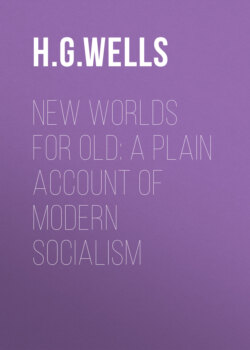Читать книгу New Worlds For Old: A Plain Account of Modern Socialism - H. G. Wells - Страница 13
На сайте Литреса книга снята с продажи.
§ 4.
ОглавлениеTable of Contents
And what I have said of the middle-class parent is true with certain modifications of all the classes above it, except that in a monarchy you reach at last one State-subsidized family—in the case of Britain a very healthy and active group, the Royal family—which is not only State supported, but also beyond the requirements of any modern Socialist, State bred. There are enormous handicaps at every other social level upon efficient parentage, and upon the training of children for any public and generous end. Parentage is treated as a private foible, and those who undertake its solemn responsibilities are put at every sort of disadvantage against those who lead sterile lives, who give all their strength and resources to vanity and socially harmful personal indulgence. These latter, with an ampler leisure and ampler means, determine the forms of pleasure and social usage, they “set the fashion” and bar pride, distinction or relaxation to the devoted parent. The typical British aristocrat is not parent bred, but class bred, a person with a lively sense of social influences and no social ideas. The one class that is economically capable of making all that can be made of its children is demoralized by the very irresponsibility of the wealth that creates this opportunity. This is still more apparent in the American plutocracy, where perhaps half the women appear to be artificially sterilized spenders of money upon frivolous things.
No doubt there is in the richer strata of the community a certain proportion of families with a real tradition of upbringing and service; such English families as the Cecils, Balfours and Trevelyans, for example, produce, generation after generation, public-spirited and highly competent men. But the family tradition in these cases is an excess of virtue rather than any necessary consequence of a social advantage; it is a defiance rather than a necessity of our economic system. It is natural that such men as Lord Hugh and Lord Robert Cecil, highly trained, highly capable, but without that gift of sympathetic imagination which releases a man from the subtle mental habituations of his upbringing, should idealize every family in the world to the likeness of their own—and find the Socialist’s Over-Parent of the State not simply a needless but a mischievous and wicked innovation. They think—they will, I fear, continue to think—of England as a world of happy Hatfields, cottage Hatfields, villa Hatfields, Hatfields over the shop, and Hatfields behind the farmyard—wickedly and wantonly assailed and interfered with by a band of weirdly discontented men. It is a dream that the reader must not share. Even in the case of the rich and really prosperous it is an illusion. In no class at the present time is there a real inducement to the effectual rearing of trained and educated citizens; in every class are difficulties and discouragements.
This state of affairs, says the Socialist, is chaotic or indifferent to a sea of wretchedness and failure, in health, vigour, order and beauty. Such pleasure as it permits is a gaudy indulgence filched from children and duty; such beauty—a hectic beauty stained with injustice; such happiness—a happiness that can only continue so long as it remains blind or indifferent to a sea of wretchedness and failure. Our present system of isolated and unsupported families keeps the mass of the world beyond all necessity painful, ugly and squalid. It stands condemned, and it must end.
